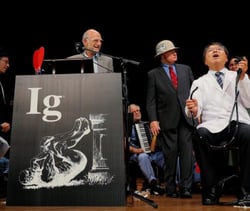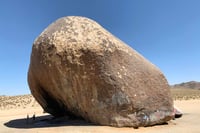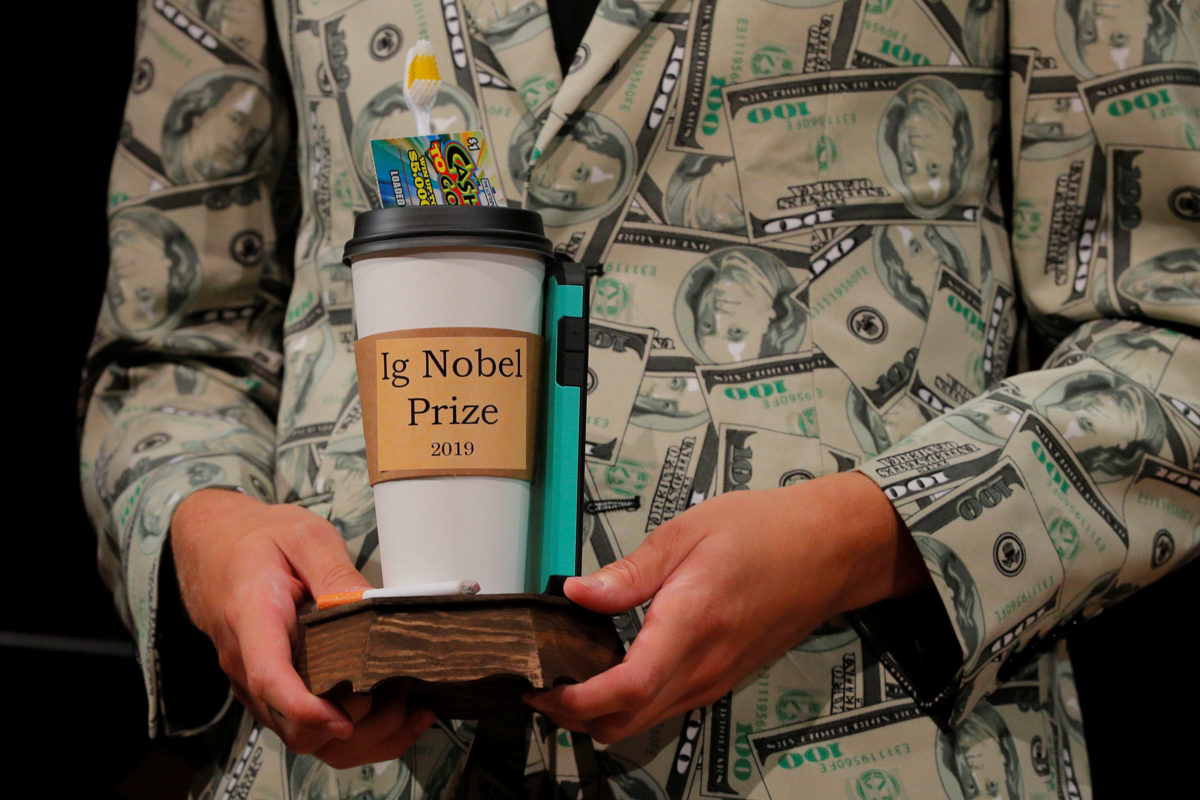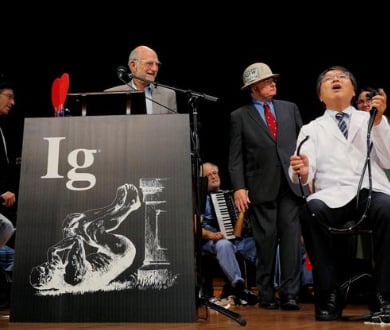 I always look forward to this time of year, even more so sometimes than the actual Nobel Prizes, because I want to see what new insights can be derived from the weird science that, as they say, first makes you laugh, then think. That's right, now we are at the 33rd First Annual Ig Nobel Prizes! Just like last year and the few years before, the Ig Nobel ceremony was conducted virtually while the pandemic is still not quelled to an extent that allowed the organizers (men and women of science, see?) to be comfortable enough to have hundreds of people packed into a raucous arena, so the paper airplane tosses and everything else was pre-taped and released online. This did not take away from the absurdity and the few laugh-out-loud moments that I (and probably hundreds of thousands of science enthusiasts tuning in from around the globe) had during the 90-minute event. I do wonder if some of these might supplant my personal top ten, but maybe not just yet. Now let's see what happened!
I always look forward to this time of year, even more so sometimes than the actual Nobel Prizes, because I want to see what new insights can be derived from the weird science that, as they say, first makes you laugh, then think. That's right, now we are at the 33rd First Annual Ig Nobel Prizes! Just like last year and the few years before, the Ig Nobel ceremony was conducted virtually while the pandemic is still not quelled to an extent that allowed the organizers (men and women of science, see?) to be comfortable enough to have hundreds of people packed into a raucous arena, so the paper airplane tosses and everything else was pre-taped and released online. This did not take away from the absurdity and the few laugh-out-loud moments that I (and probably hundreds of thousands of science enthusiasts tuning in from around the globe) had during the 90-minute event. I do wonder if some of these might supplant my personal top ten, but maybe not just yet. Now let's see what happened!
The Esteemed Guests and the Theme
This year's presenters were again bemused Nobel laureates, which included two-time winner Barry Sharpless who recently earned his second prize in 2022, and Ardem Patapoutian, who won in 2021 and who I wasn't aware could play a mean trumpet. I thought the Nobel laureates asked some very poignant questions after giggling at their new Ig Nobel counterparts, as they led the freshly minted "winners" to explain how their achievements could benefit science as a whole after people could stop laughing for a moment and think about it. There were of course the 24/7 lectures in which the "lecturers" had to deliver their technical explanations in under 24 seconds along with a seven-word sentence summarizing their field, but most of the speakers went over time and were drowned out by various instruments...you never realize how many scientists are accomplished musicians (and fairly good singers during the not-opera), and it really makes me wish I had kept going with my violin.
This year's theme was water, and in a way, every prize had something tangentially associated with the chemistry or hydrodynamics of water. The 24/7 lectures that I mentioned before were fun and we had some very cool seven-word sentences, which include:
- Liquids flow in response to natural forces.
- Geckos bellies help them walk on water.
- Ultracold smashed ice neither floats nor sinks (I think this one cheated because ultra and cold are two words but we'll let it slide)
Just like last year, the winners received a PDF that they could print out and fold into a 3-D Ig Nobel prize shape. This time it was a cola box that said "Ig Pseudo Cola" that would have contained mini-cans of soda if not for their disclaimer of "contains fewer than 12 cans" that saved them from any legal complaints. The other prize was a 10 trillion Zimbabwe dollar bill, which we might laugh at but then you have to think about the rampant inflation going on over there, and then about the inflation that's happening over here too (seriously, milk prices are insane now).
As you may have guessed, the Ig Nobel ceremony's official beverage was water.
The New Winners!
I think I may have laughed more this year than last even though I knew what to expect because some of these studies were really out there. You can check out a list of winners here (as soon as the webmaster updates, anyway) and I summarized their achievements below.
 CHEMISTRY & GEOLOGY PRIZE - I don't recall the last time I ever did this, but apparently there is a reason behind why scientists like to lick rocks. Once upon a time, before the invention of spectrometers and other analytical devices, the only way to do research was really through your senses, so scientists would taste the rock to determine its composition. The saliva obviously also provides some moisture that could reveal some fine details of said rock. The gentleman who won this award, Jan Zalasiewicz, licked a rock or two to demonstrate, certainly bolder than I!
CHEMISTRY & GEOLOGY PRIZE - I don't recall the last time I ever did this, but apparently there is a reason behind why scientists like to lick rocks. Once upon a time, before the invention of spectrometers and other analytical devices, the only way to do research was really through your senses, so scientists would taste the rock to determine its composition. The saliva obviously also provides some moisture that could reveal some fine details of said rock. The gentleman who won this award, Jan Zalasiewicz, licked a rock or two to demonstrate, certainly bolder than I!
LITERATURE PRIZE - This prize was awarded to researchers who observed the sensations that people feel when they repeat words, well, repeatedly...like, 20 or more times in a row. They also demonstrated this by repeating the word "the" about 50 times through various videos of them traveling throughout the land, and now we have learned the terms "word alienation" and "semantic satiation," because in a way the repetitive use of "the" was both grating yet triggered some ASMR after a while!
MECHANICAL ENGINEERING PRIZE - This one was super strange because the research group made the observation that spider legs kind of curl up when they die, and that this was due to the lack of hydraulic pressure in their bodies to keep the legs straight once they pass on. Using superglue and a syringe, they could use euthanized spiders as "necrobotic grippers" to pick up many different types of objects, and the object lesson here is that one day we might be able to repurpose more biotic materials for mechanical applications, though hopefully they won't trigger my flight response as strongly as a wolf spider.
PUBLIC HEALTH PRIZE - Dr. Seung-Min Park of Stanford University invented the "Stanford Toilet," a "smart" toilet that not only lets you pee and poop, but also analyzes your urine and feces while also snapping pictures of your waste and your anus. As Dr. Park mentioned, there were some privacy concerns since the toilet would collect biological information, including disease biomarkers, besides getting a gander of one's butthole, but the broader application of providing real-time health data while promoting good hygiene is very important. As he says, "Don't waste your waste!"
COMMUNICATION PRIZE - I can't really speak or process speech backwards, but apparently a lot of people in other countries do this on the regular! These winners studied the mental activities of people who are experts in speaking backwards, even in complete sentences. There are broader neurological applications to this study, as the brain uses certain strategies and neural pathways to arrange phonemes, or the individual syllables and sounds of words, to process speech. Understanding how backwards speakers process backwards speech can provide insights into how the brain works!
MEDICINE PRIZE - This one elicited a Ryan Reynolds "but why?" from me because the group decided to use cadavers to determine if each nostril has the same number of nasal hairs, which is both weird and gross on the surface. But then, given their interest in alopecia and the fact that some alopecia patients have missing nasal hairs only in one nostril, it made sense because of the implications for infection and allergies for the afflicted individuals. There's always a method to the madness!
NUTRITION PRIZE - This one also shocked me at first (pun totally intended) because the inventors tested the effect of electrified chopsticks and drinking straws on changing the taste of food. They likened it to when people would lick the ends of 9-volt batteries. The electrified utensils actually made low-salt foods taste more salty, which meant that the diet foods that folks eat could now taste better without the sodium bombing in their bodies. This invention is going to market soon, and has the potential to raise awareness for proper health and nutrition while making said healthy food actually taste good!
EDUCATION PRIZE - This prize tugged at my heart, because every educator's nightmare is a classroom full of bored students. In this case, they measured the effect of perceived boredom in teachers on the boredom of their students, a study that was probably millenia in the making as teachers have always tried to find new ways to motivate students to learn. By quelling academic boredom, we can potentially improve learning outcomes, so huzzah to these winners!
PSYCHOLOGY PRIZE - This prize was decades in the making as the senior author, Yale professor Stanley Milgram, first published this in 1968, but had sadly passed. His student accepted the award for determining the effect of having people look up if they also see a group of people looking up. The more people looking up, the more likely passersby will also look up. Milgram had done other very famous experiments as well, but this goofy scenario has contributed to better methods of predicting collective behavior, as the winners suggested the paper had been cited at least 700 times!
PHYSICS PRIZE - Apparently if enough fish have sex at the same time, you can measure ocean water mixing! The principal fish in this study was the lowly anchovy, but this could also be true of sea bass and whales too, I guess (I know whales aren't fish but they have sex too). This effect is more pronounced in coastal waters, and has the effect of more efficiently mixing warm and cold water at different depths if a large enough population of fish do the nasty at the same time. Given the global extinction crisis and climate change affecting ocean temperatures, one wonders whether this effect will be diminished in the future, but at least now we know it exists!
Support Absurdity That Actually Drives Scientific Innovation!
As the master of ceremonies keeps reminding us, the Ig Nobel award ceremony has no actual funding, so it relies solely on generous donations from the scientifically curious. Therefore, it would be cool if you could spare some cash to help them keep this fantastic quirk of the science community alive!
Congratulations to everyone who got an Ig Nobel this year, and now we can look forward to the Nobel Prizes and what next year will bring us!




